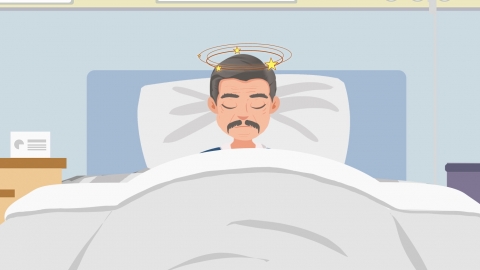What causes dizziness as a sequela of cerebral infarction?
In general, dizziness as a sequela of cerebral infarction may be caused by psychological factors, aging, postural changes, cerebral hypoperfusion, hypertension, and other reasons. Symptomatic management through general treatment and medication may be necessary. If experiencing discomfort, it is recommended to seek timely medical attention and undergo appropriate treatment under a physician's guidance. Detailed analysis is as follows:

1. Psychological factors
Following a cerebral infarction, patients may develop anxiety, depression, or other emotional disturbances due to lifestyle changes and physical functional limitations. This may lead to disturbances in neurotransmitters and the endocrine system, thereby affecting cerebral blood flow and neural regulation, resulting in worsened dizziness. Symptoms may include low mood, reduced interest, and sleep disturbances. Psychological counseling is recommended for patients, which may improve psychological status and alleviate dizziness through methods such as meditation or listening to music.
2. Aging
With advancing age, vascular wall elasticity decreases, making it easier for plaques to form, which affects cerebral blood flow and leads to insufficient oxygen supply to the brain, causing dizziness. It is recommended to maintain a healthy lifestyle, including regular exercise, balanced diet, smoking cessation, and alcohol moderation, which can help delay vascular aging and improve cerebral blood supply.
3. Postural changes
Following a cerebral infarction, patients may experience dizziness due to sudden postural changes, such as rapidly moving from lying down to sitting or standing up, which can cause blood to pool in the lower extremities, reducing cerebral blood perfusion. Patients are advised to perform postural changes slowly and avoid sudden movements.
4. Cerebral hypoperfusion
Following a cerebral infarction, damage to cerebral vessels, lumen narrowing or occlusion can lead to insufficient cerebral perfusion and cerebral tissue hypoxia, causing dizziness, which may be accompanied by headache, nausea, vomiting, and limb weakness. It is recommended to use medications that improve cerebral circulation as directed by a physician, such as aspirin enteric-coated tablets, warfarin sodium tablets, rosuvastatin calcium tablets, etc., to enhance cerebral blood circulation.
5. Hypertension
If blood pressure is poorly controlled after a cerebral infarction, the increased pressure on cerebral vessels in a hypertensive state can cause vascular wall damage, impair blood flow, and lead to cerebral hypoperfusion, causing dizziness, which may be accompanied by symptoms such as headache, palpitations, and blurred vision. It is recommended to take medications such as amlodipine tablets, benazepril tablets, methyldopa tablets, etc., under medical guidance to control blood pressure within the normal range.
It is recommended to engage in moderate physical activity daily, choosing mild exercises such as tai chi or Baduanjin, which can help enhance cardiopulmonary function, promote blood circulation, and improve cerebral blood supply.




